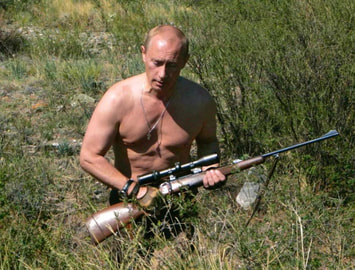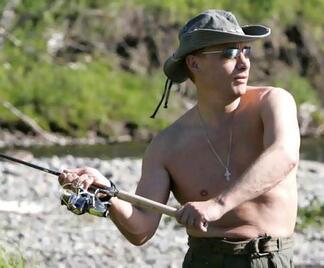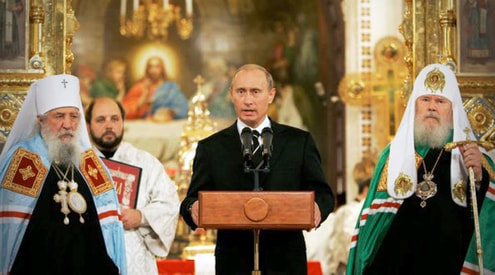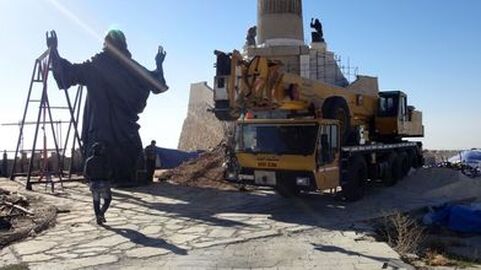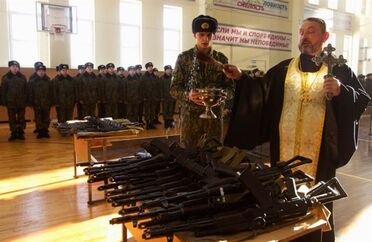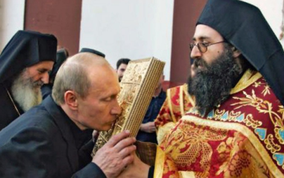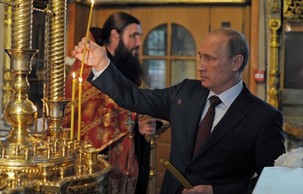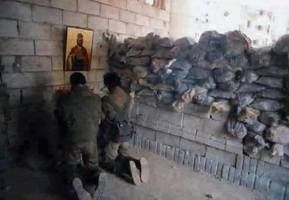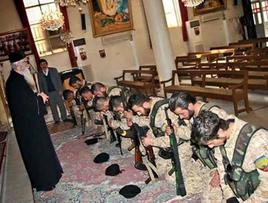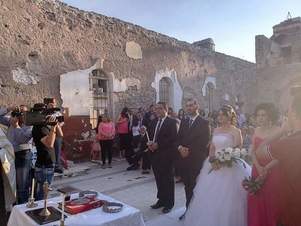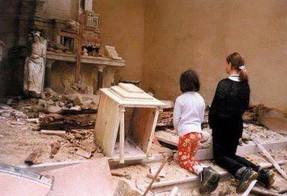Why all those shirtless photos?
To expose his baptismal cross.
To expose his baptismal cross.
Photo Below:
In January 2012, Putin promised to protect Christianity worldwide. Putin met with Patriarch Kirill of Moscow (Russia's Orthodox Church Patriarch) at Moscow’s main cathedral. During this meeting, the Patriarch told Putin that every five minutes one Christian was dying for his or her faith in some part of the world, specifically in countries such as Iraq, Syria, Egypt, Pakistan and India; and that Christians are facing repressions all over the world. The cleric asked Putin to make the protection of Christians one of the foreign policy directions in the future. Putin told the Patriarch that he could count on it.
In January 2012, Putin promised to protect Christianity worldwide. Putin met with Patriarch Kirill of Moscow (Russia's Orthodox Church Patriarch) at Moscow’s main cathedral. During this meeting, the Patriarch told Putin that every five minutes one Christian was dying for his or her faith in some part of the world, specifically in countries such as Iraq, Syria, Egypt, Pakistan and India; and that Christians are facing repressions all over the world. The cleric asked Putin to make the protection of Christians one of the foreign policy directions in the future. Putin told the Patriarch that he could count on it.
Putin was greatly influenced by Ivan Ilyin, a Russian political and religious thinker. Ilyin promoted ethnic-religious traditionalism, and the unique "Russian soul." Ilyin believed Russia could recover from the Bolshevik revolution and recover itself spiritually then politically. Putin has mentioned Ilyin in many of his speeches.
Putin has described the central role of the Russian Orthodox Church as Russia's "spiritual shield," that a church-grounded spiritual resistance to the problems Russia faces is as important to Russia's security as a nuclear shield. Putin has been promoting Ilyin's vision for Russia, based on the promotion of the Church and traditional values which he feels will bring a spiritual renewal to the Russian people.
In Putin's speeches he has spoken about the need for religious revival and the valuable role that the Church plays, stating that the Church plays a major role in preserving Russia's rich historical and cultural heritage and in supporting moral values. He has stated that the Church brings unity, strengthens family ties, and educates the younger generation in a spirit of patriotism.
Putin's core statements in many of his speeches have always focused on extreme patriotism and Christian faith. He has also stated:
“We must protect Russia from that which has destroyed American society”.
In a 2014 speech, Putin said:
“Another serious challenge to Russia’s identity is linked to events taking place in the world. Here there are both foreign policy and moral aspects. We can see how many of the Euro-Atlantic countries are actually rejecting their roots, including the Christian values that constitute the basis of Western civilization. They are denying moral principles and all traditional identities: national, cultural, religious and even sexual.
"They are implementing policies that equate large families with same-sex partnerships, belief in God with the belief in Satan. The excesses of political correctness have reached the point where people are seriously talking about registering political parties whose aim is to promote pedophilia.
"People in many European countries are embarrassed or afraid to talk about their religious affiliations. Holidays are abolished or even called something different; their essence is hidden away, as is their moral foundation. And people are aggressively trying to export this model all over the world. I am convinced that this opens a direct path to degradation and primitivism, resulting in a profound demographic and moral crisis.”
~~~~~~~~~
Putin has described the central role of the Russian Orthodox Church as Russia's "spiritual shield," that a church-grounded spiritual resistance to the problems Russia faces is as important to Russia's security as a nuclear shield. Putin has been promoting Ilyin's vision for Russia, based on the promotion of the Church and traditional values which he feels will bring a spiritual renewal to the Russian people.
In Putin's speeches he has spoken about the need for religious revival and the valuable role that the Church plays, stating that the Church plays a major role in preserving Russia's rich historical and cultural heritage and in supporting moral values. He has stated that the Church brings unity, strengthens family ties, and educates the younger generation in a spirit of patriotism.
Putin's core statements in many of his speeches have always focused on extreme patriotism and Christian faith. He has also stated:
“We must protect Russia from that which has destroyed American society”.
In a 2014 speech, Putin said:
“Another serious challenge to Russia’s identity is linked to events taking place in the world. Here there are both foreign policy and moral aspects. We can see how many of the Euro-Atlantic countries are actually rejecting their roots, including the Christian values that constitute the basis of Western civilization. They are denying moral principles and all traditional identities: national, cultural, religious and even sexual.
"They are implementing policies that equate large families with same-sex partnerships, belief in God with the belief in Satan. The excesses of political correctness have reached the point where people are seriously talking about registering political parties whose aim is to promote pedophilia.
"People in many European countries are embarrassed or afraid to talk about their religious affiliations. Holidays are abolished or even called something different; their essence is hidden away, as is their moral foundation. And people are aggressively trying to export this model all over the world. I am convinced that this opens a direct path to degradation and primitivism, resulting in a profound demographic and moral crisis.”
~~~~~~~~~
The Russian Orthodox Church, which has reclaimed its traditional role in Russia since Putin came to office, described Russia's fight against the ISIS and other jihadi groups as a "holy war." Vsevolod Chaplin, head of the the Russian Orthodox Church's Public Affairs Department said:
"The fight with terrorism is a holy battle and today our country is perhaps the most active force in the world fighting it.
"The fight with terrorism is a holy battle and today our country is perhaps the most active force in the world fighting it.
|
In October of 2013, after over two years of brutal war in Syria at the hands of foreign Islamists, a giant bronze statue of Jesus was placed on Mount Sedneya in Syria. The statue is 105 feet tall and can be seen from Lebanon, Jordan, Palestine and Israel.
The statue was funded by the Russian Orthodox Church and the Russian government. |
Putin’s father was a communist, but his mother was an Orthodox Christian. Putin was baptized as a child but was not a practicing Christian during his KGB years. During the late 'Soviet Union' period, Putin went back to his Christian roots. By the late 1990’s, Putin was wearing his baptismal cross openly, and his re-birth into Christianity has been a major part of his life and political career as Prime Minister and now as President. Many of his bare-chested photo ops were an excuse to display his Christian Cross to show what he stands for.
The Russia-Syria connection:
Russia has been a historic ally of Syria, with deep military, social and economic ties to the country since 1950.
Russia has had a historically strong, stable, and friendly relationship with Syria, as it did with most of the Arab countries up until the Arab Spring. But Russia kept its close ties with Syria, and in fact, the ties grew stronger after the fall of Libya and Egypt to Islamists.
Russia also has a naval base in the Mediterranean at the Syrian port of Tartus for its Black Sea Fleet, which is another factor in their strong ties financially and militarily.
In early 2012, Russia took a strong stand in support of Syria's government and against international action that was initiated and promoted by Western and Arab/Muslim countries against Syria. See: U.S. involvement in the creation of a 500 million dollar program to train and arm terrorists
Syria and the USSR first started up ties in February 10, 1946 right before Syria gained her independence from France. Syria and the USSR formed an agreement that laid out diplomatic and political support from the USSR in the international arena and also Soviet military help for the foundation of Syria's National Army. Another agreement signed on April 10, 1950 further cemented Soviet–Syrian relations.
Russia is following through with a long-time commitment and relationship with Syria and recognized that an Islamist takeover would destroy Syria and turn Syria into an Islamic State.
Russia has been a historic ally of Syria, with deep military, social and economic ties to the country since 1950.
Russia has had a historically strong, stable, and friendly relationship with Syria, as it did with most of the Arab countries up until the Arab Spring. But Russia kept its close ties with Syria, and in fact, the ties grew stronger after the fall of Libya and Egypt to Islamists.
Russia also has a naval base in the Mediterranean at the Syrian port of Tartus for its Black Sea Fleet, which is another factor in their strong ties financially and militarily.
In early 2012, Russia took a strong stand in support of Syria's government and against international action that was initiated and promoted by Western and Arab/Muslim countries against Syria. See: U.S. involvement in the creation of a 500 million dollar program to train and arm terrorists
Syria and the USSR first started up ties in February 10, 1946 right before Syria gained her independence from France. Syria and the USSR formed an agreement that laid out diplomatic and political support from the USSR in the international arena and also Soviet military help for the foundation of Syria's National Army. Another agreement signed on April 10, 1950 further cemented Soviet–Syrian relations.
Russia is following through with a long-time commitment and relationship with Syria and recognized that an Islamist takeover would destroy Syria and turn Syria into an Islamic State.
Photos Below: Members of the Syrian Army prepare to battle al-Qaeda and ISIS by praying before a photo of Jesus and in church being blessed by a cleric.
Syrians continue on with life, getting married in a bombed church and children pray before an alter inside a bombed church.
Syrians continue on with life, getting married in a bombed church and children pray before an alter inside a bombed church.
Want to support Cheri Berens' research? Buy her book:
An American Woman Living in Egypt: Life during an Islamic takeover
Available at Amazon or order it from your local bookstore
Jam-packed with explosive information about U.S. involvement in Islamist takeovers, Cheri Berens details why there is a similar crisis lurking subversively inside America.
An American Woman Living in Egypt: Life during an Islamic takeover
Available at Amazon or order it from your local bookstore
Jam-packed with explosive information about U.S. involvement in Islamist takeovers, Cheri Berens details why there is a similar crisis lurking subversively inside America.
